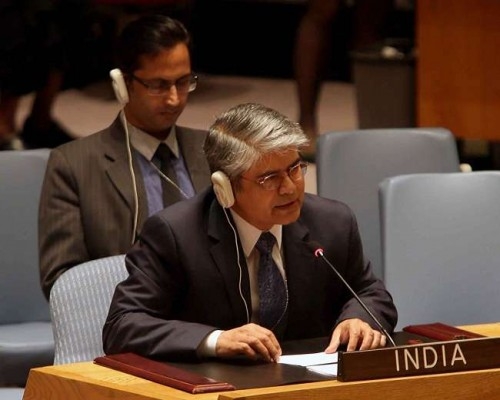
With the Indian peacekeepers in South Sudan, the world’s newest country, hunkered down protecting refugees as intense fighting rages around them, the UN Security Council is monitoring the situation there and hoped targeted sanctions would help resolve the conflict, Council President Ramlan Bin Ibrahim said .
Speaking to reporters, Ibrahim said, “We are closely monitoring” the situation in South Sudan and “we are looking at developments in the region and what sort of signals” are there.
“We hope that the establishment of targeted sanctions mechanism” under Council resolutions “will provide the necessary incentives for the parties to the conflict to reach a peaceful settlement,” Ibrahim, who took over the rotating Council presidency for June said.
Last month, India’s Permanent Representative Asoke Kumar Mukerji had written to the Council resident for May, Raimonda Murmokaite of Lithuania, “It is extremely important that the Security Council take urgent action to prevent any casualties and collateral damage with regard to the Indian troops and internally displaced people (IDPs)” or refugees.
After the prescient warning, an Indian Army colonel with the UN peacekeeping force protecting a refugee camp in Malakel was injured in crossfire between the two rival forces last week. About 2,000 Indian troops form the largest contigent with UNMISS.
Although the Council extended the mandate of UNMISS till November and reiterated its mission, it did not take any concrete steps to end the conflict or reinforce the peacekeeping operation.
Forces loyal to President Salva Kiir Mayardit and supporters of former vice president Riek Machar Teny of Sudan People’s Liberation Movement in Opposition (SPLM-IO) having been fighting it out since 2013, barely two years after the South Sudan was carved out of Sudan. The conflict escalated last month after a top government commander, Major General Johnson Olony, defected to Riek Machar’s side.
Ibrahim said, “We regret that the leaders have not been able to make progress and reconcile their differences despite numerous attempts beig made to reach a mediated peace agreement.”
He said that a briefing by the UN Mission in South Sudan (UNMISS) Force Commander, Lt. Gen. Yohannes Gebremeskel Tesfamariam of Ethiopia and consultations on South Sudan were scheduled later this month.
Asked if the Council consultation would remain just that or lead to action, Ibrahim did not give a direct answer but said the consultations were required for members to make observations and express their thinking on positions and decisions.
As for an arms embargo on South Sudan’s rival factions, he would only say that it could be considered “appropriately.”
Meanwhile, in another sign of the worsening situation there, President Salva Kiir’s government ordered Monday the expulsion of Toby Lanzer the Resident Coordinator and Humanitarian Coordinator for South Sudan and Secretary General Nan Ki-moon’s Deputy Special Representative.
Ban’s spokesperson Stephane Dujarric condemned Lanzer’s expulsion and said efforts, so far unsuccessful, were underway to get the government to reverse its decision.
According to the UN refugee agency, Dujarric added, “heavy fighting in South Sudan’s Unity and Upper Nile States over the last two months has displaced more than 100,000 people and blocked humanitarian aid deliveries for some 650,000 people.”
The Sudan Tribune reported that in South Sudan’s capital, Juba, Salva Kiir’s spokesman called Lanzer an “enemy,” who was “predicting the collapse, the total collapse” of the country.